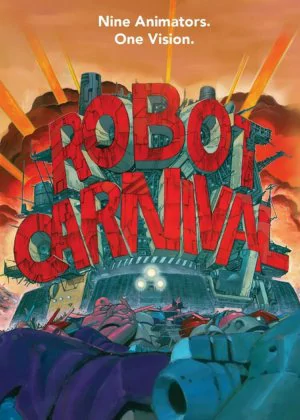Robot Carnival
Movie details

1987 was a superb year for anime anthologies. Together with Neo-Tokyo, Robot Carnival [Robotto Kanibaru] set out to establish one of the finest anime traditions around. Since then these anthologies have become a beacon of quality and originality, something other animation projects could aspire to be. It's been a while since I last watched Robot Carnival in full though, so I was looking forward to giving this one another run. And even though the film has become a clear relic of its time, there is still plenty to love here.
![screen capture of Robot Carnival [Robotto Kanibaru]](/thumbs/style/site/1200xauto/robot-carnival-1.webp)
Robot Carnival has often been compared to Disney's Fantasia. There's a truth to that comparison, though not in any way that would lead to a meaningful recommendation. While most of the shorts in Robot Carnival feature little to no dialogue and are strongly tied to their soundtracks, this isn't a reworking of popular classic music with already-famous characters. Instead directors were let loose to explore a central theme (ie robots) and go wild with it, without having to worry about what the others were doing and/or whether it would lead to a coherent whole. Because of that, Robot Carnival is so much more interesting as an anthology.
The film starts off with an extended opening sequence, directed by Atsuko Fukushima and Katsuhiro Otomo, where a big, explosive billboard-like city arrives into town (though destroying most of the buildings along the way). To go full circle, the films ends with the same construction driving off again into the sunset. It's a pretty cool way to announce a film, although a bit weird to see a titular representation of said film crush half a town and its poor villagers. Still, the animation is pretty great and it makes for a good wrap-around segment. 4.0*/5.0*
All of this is just a prelude to the true opener of the film. Franken's Gear is a pretty simple, robotic take on the classic Frankenstein resurrection scene. While the subject matter isn't all that exciting, director Koji Morimoto can turn anything into gold (and he usually does). This early short isn't half as accomplished as some of his later films, but even then it's still one of the stand-out films of this anthology. The animation is amazing and the way Morimoto combines it with the soundtrack is exemplary. 4.5*/5.0*
![screen capture of Robot Carnival [Robotto Kanibaru]](/thumbs/style/site/1200xauto/robot-carnival-2.webp)
The second (Deprive by Hidetoshi Omori ) and fourth (Starlight Angel by Hiroyuki Kitazume) entries are considerably worse. Not so much that they bring the entire film down, but they do make the start of the film a little rougher than need be. Both feature a very similar, 80s neon look that, at least apart from the animation quality, has little to add to the pile of 80s anime already out there. Plain narratives, unimaginative art styles and boring soundtracks stand in the way of the good time these shorts are pursuing. 2.0*/5.0*
Luckily Yasuomi Umetsu's Presence edged itself right in between these two entries, immediately raising the quality again. It's a surprisingly moving short, especially for those familiar with the later work of Umetsu. Presence is a classic toy maker story at heart, but told in a very novel and original way. The animation is beyond stunning, even to this date, with incredible details and rich character designs making for a visual feast. This is a prime example of why I like these anthologies so much. 4.5*/5.0*
Next up is one of the pivotal entries in the anthology. With two sublime and two disappointing shorts preceding it, Manabu Ohashi's Clouds is somewhat of a make it or break it entry. And it's probably a very divisive one too, because it's by far the most experimental of the bunch. The animation is quite sparse and repetitive, but the atmosphere of the short is simply sublime, built entirely on a grand score and beautiful sketch-like animations. Not for everyone, but it's a definite favorite of mine. 4.5*/5.0*
![screen capture of Robot Carnival [Robotto Kanibaru]](/thumbs/style/site/1200xauto/robot-carnival-3.webp)
The anthology delves into more easily consumable territory right after, which was no doubt the sane thing to do. Hiroyuki Kitakubo's A Tale of Two Robots is a fun and entertaining little diversion about two wooden mechas battling it out in ancient Japan. The animation is solid, the action is properly destructive and the atmosphere is light and whimsical. It's the perfect breather in between all the crazier, more experimental shorts. 4.0*/5.0*
The finale comes from Takashi Nakamura, whose Nightmare is probably the entry that resembles Disney's original Fantasia the most. It's a mad rush through a metropolis being overtaken by robots, a guy and his motorcycle narrowly escaping the metal threat engulfing the entire city. Beautifully animated, madly creative and a little bonkers, it's the ideal finish to an anthology that pushes metal-first sci-fi and gave its directors ample freedom to showcase their creativity. 4.0*/5.0*
If you're a core anime fan, these shorts may be a little too alien and unfamiliar, but if you have a soft spot for creative animation then there's plenty to love here. Like most anime anthologies, Robot Carnival is a film that seeks out the boundaries of anime. The animation is exemplary, the art styles wildly original and the stories support the madness. There are two shorts that don't quite cut it, but the boundless quality of the others easily makes up for that. If you haven't seen this one yet and you can stomach a good animation anthology, it comes warmly recommended.